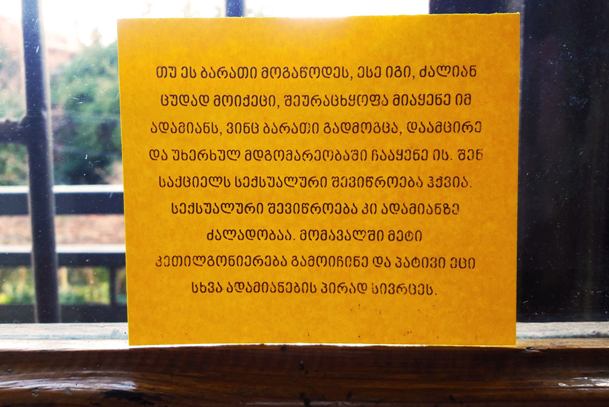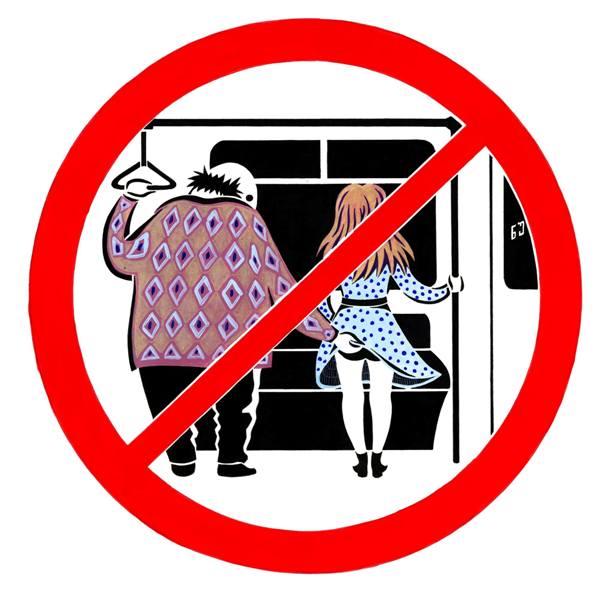Lana Giorgidze
“Several months ago, I was going to work by taxi; the driver was masturbating in the car… I could neither cry nor ask him to stop the car. Who has never gone through that, would never realize how confusing and queasily this situation is. As soon as we reached the place, I dropped the money and rushed out of the car.”
“It was evening, about 10 pm. I was waiting for the train in the metro station. An old man approached me and started asking questions: are you married? Why does your husband allow you to go out in the street so late? I felt awkward and answered I was married but the rest was not his business. Generally, it is golden rule that you must not answer the questions of the intrusive person but I thought he would leave me alone if I answered his question. However, I was wrong – my answer encouraged him and followed me into the train. He would have been happy to accompany me even till the home unless I had called the police officer for help. Having seen the police officer, he disappeared. I suggest everybody to react to all similar facts. The harassers and abusers take advantage of our weakness so we must not show them that we are weak!”
“I do not like to get sun tan on the overcrowded beaches. My friend and I often go to the places with fewer people. Several times I noticed men masturbating in front of the people (of course they all were women). Now I regret that I did not react to those facts and left the territory.”
These three stories are very few among those posted in the Facebook page – what happened in the street. Although real victims tell the stories, people do not believe they are true. The stories are mostly written by anonymous authors because speaking about sexual harassment facts in public is often associated with fear, shame and different reactions from the society.
“Sexual harassment in public space is one of the forms of gender-based discrimination, which is direct product of gender inequality. Daily, almost every woman becomes victim of any form of sexual harassment. The biggest problem is that its political significance is neglected and normalized in heteronormative culture,” the publication of the Union Sapari – Sexual Harassment in Public Space: Analysis of the Legislative Practice reads.
Union Sapari is the initiator and organizer of the campaign – “Do not stand it, tell the story, sexual harassment is prohibited.” Within framework of the campaign, information booklets were prepared so that people received information about the facts of sexual harassment and ways to be protected from it not only via facebook page but from different media sources too.
As the sexual harassment is beyond legislative regulations both in public space and in working places in Georgia, the victims cannot protect themselves from harassers. Until the legislation regulates similar facts, the Union Sapari disseminated so-called “yellow papers.” The victims of sexual harassment can hand the following letters to the harassers: “If you receive this letter, it means you acted very nastily; you have insulted the person, who handed you the letter; you degraded her and placed her in an awkward situation. The action you did is sexual harassment. It is violence against a person. In future behave with more prudence and respect private space of other people.”

The event recently organized by the Public Defender of Georgia also proved how urgent the problem is. The public debates “Sexual Harassment – What Challenges We Face” was organized by the PDO in the hotel Courtyard Marriot on March 31.
“Although sexual harassment facts happen both in public space and in working places, nobody speaks about it loudly. People do not speak because of stereotypes, spread practice of blaming the victim in the incidents and lack of response mechanisms on similar facts. It is evident that even statistics of similar incidents is very poor. Even PDO receives very few notifications about sexual harassment facts. The Public Defender recommends the respective institutions to elaborate legislative initiatives to improve the national legislation in this direction,” Public Defender Ucha Nanuashvili stated in his welcoming speech during the public debates.
Chairman of the Gender Equality Council at the Parliament of Georgia Dimitry Tskitishvili informed the participants of the public debates about the vision of the MPs about the issue of sexual harassment. He said, the Council works in this direction and has already elaborated one-year action plan.
“We are ready to activate working on this issue and introduce relevant amendments to the anti-discrimination law. We need legislative norms to identify the problem. However, not only definition shall be determined but also the preventive measures shall be worked out. Sanctions shall be fixed so that respective bodies could identify the facts and take preventive measures. However, we think the general culture in the society, which accepts “philanderers” as positive is the main obstacle. The men shall take part in similar discussions so that they acknowledged that their wives, mothers and daughters may also become victims of sexual harassment. We should hear their opinions and change public attitudes,” Dimitry Tskitishvili said.
Executive director of the Union Sapari Baya Pataraya spoke about sexual harassment in public space and working places.
“The women do not perceive all forms of sexual harassment as sexual harassment. They understand it is not pleasant situation but cannot give the appropriate name to the incident because they have low awareness about it. Although there is a problem of awareness, it is important to underline the legislative miscarriages. It is already a problem that there is no definition of the sexual harassment in any legal document. I believe three changes must be done: definition of the sexual harassment shall be added in the labor code – the NGO Article 42 of the Constitution has already submitted the draft-law to the Parliament about it and the committees had hearings; sexual harassment shall be regulated in public space, though the victims shall be able to call patrol police in accordance to the administrative code. There is an issue of evidence that can be resolved: the harassment shall be added to the anti-discrimination law,” Baya Pataraya said.
During the meeting Baya Pataraya clarified the meaning of sexual harassment. She said any form of interaction with the person, which is caused by his/her gender identity (or meant by gender identity), by sexual orientation or gender self-demonstration and aims to irritate, bother, scare, degrade or/and create scary situation for the victim is sexual harassment.
Street harassment may be: whistling/signaling; calling sexually degrading phrases, demanding the name or contact information, sexist comments, evaluating comments, vulgar gesticulation, showing genitals or masturbation in public space, unpleasant touching or friction, sexual violence and any action, which aims at irritating, bothering, scaring and degrading of the victim.
News
December 13, 2023
Ethnic minorities outside the peace dialogue
November 6, 2023
‘Peace’ agenda of political parties
Popular
Articles
February 13, 2024




